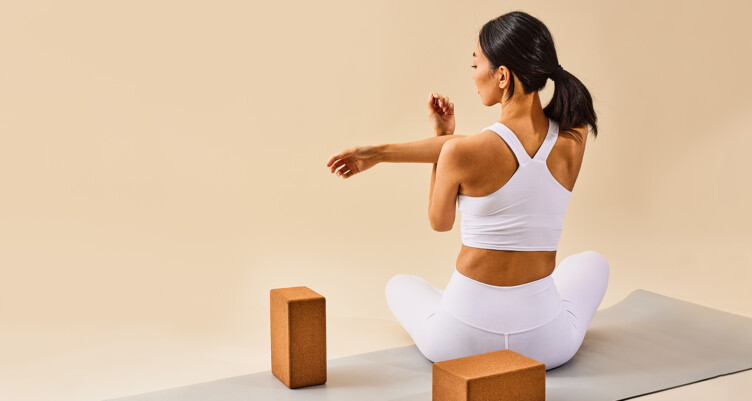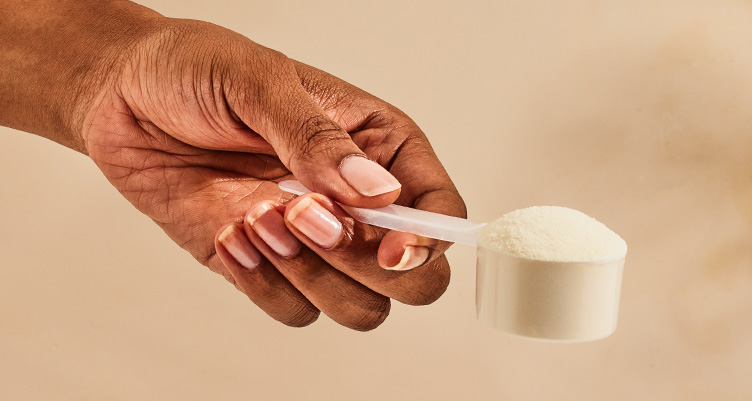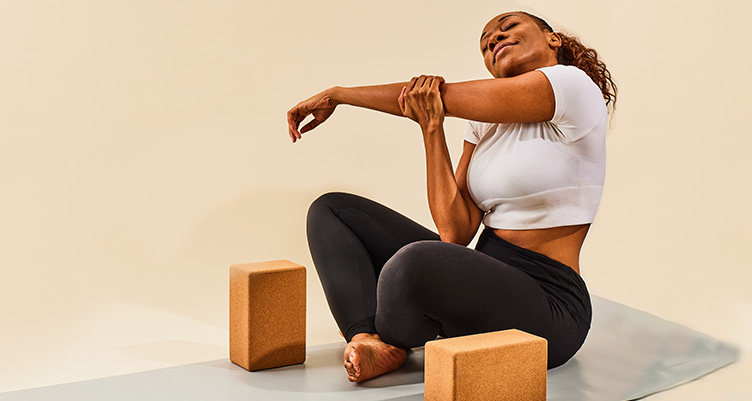Best Collagen Peptides Benefits for Skin, Joints & More

- Collagen is the body’s most abundant protein, accounting for 30% of the body’s total protein.
- Since collagen production declines with age, a collagen supplement helps support healthy skin, bones and joints. Collagen peptides are hydrolyzed, which makes them easier for the body to absorb.
- Learn how to choose the best collagen supplements for you. Plus, learn practical tips for incorporating them into your busy lifestyle.
Collagen supplements are everywhere—coffee creamers, gummy vitamins and protein bars. And for good reason: benefits of a daily scoop may include healthy skin, bones and joints.[1]
Even A-list celebrities swear by collagen peptides to help maximize their body’s potential and age gracefully. But with so many collagen supplements on the market, choosing the best collagen peptides can feel daunting. Which type of collagen is best? What ingredients should you avoid? And what the heck does hydrolyzed collagen mean?
Keep reading to learn more about the curious world of collagen peptides, including the many health benefits, how to choose the right supplement for you and how to add more collagen into your routine.
What is Collagen?

Collagen is the most abundant protein in the body, making up about 30% of total protein.[2] Some even call it the “glue of the body” because its strong fibers hold together bones, skin, joints, tendons and ligaments.
As we age, collagen production starts to decline (poor diet, sun damage and exposure to toxins can also speed up this process). This leads to skin that’s less elastic and more susceptible to wrinkles and fine lines.[3]
What are Collagen Peptides?
If you’ve noticed signs of aging, such as brittle nails, stiff joints and wrinkles, it’s a good time to start supplementing your body’s collagen supply. One of the best ways? Collagen peptides. Also known as hydrolyzed collagen, collagen peptides are made through a process called hydrolysis.[4] The collagen is broken down into small pieces so the body can better absorb it.
Collagen peptides provide essential building blocks for natural collagen production. Glycine is the most common amino acid in collagen; it’s what gives collagen a strong and resilient structure.[5] Collagen supplements are the most abundant sources of this amino acid.
Sources of Collagen
If you want to boost your collagen intake, there are many collagen-rich foods to include in your diet. The connective tissue of animals is a great place to start.[6]
Here are a few examples:
- Chicken skin
- Pork skin
- Beef
- Fish
- Bone Broth
- Sardines
Types of Collagen
The body has 28 types of collagen, but the most common and important types include type 1 and type III.
- Type I is the most prevalent type of collagen, making up 90% of the body’s collagen.[7] It is strong and flexible, found in all connective tissues. This includes bones, skin, joints, cartilage and teeth.
- Type III is the second most prevalent type of collagen. It acts as a flexible mesh that supports cells and organs.[8]
What are the Benefits of Collagen Peptides?
Joint & Bone support

The body’s joints, bones and ligaments depend on the amino acids found in collagen for strength and flexibility. Many studies have found that collagen peptide supplements may benefit joint comfort and function.[9] They also promote joint flexibility and support bone strength.
Glowing & Hydrated Skin

You might not find them behind the beauty counter, but taking collage peptides for skin may provide age-defying results.
Using a hydrolyzed collagen supplement may support skin elasticity (what keeps skin plump and firm). It may also boost hydration and prevent signs of aging (think fine lines and wrinkles).[10]
Taking collagen peptides for hair may also have benefits. Collagen helps to stimulate the growth of keratin, a protein in hair, skin and nails. This may make hair follicles stronger and less prone to breakage.[11]
How to Choose the Best Collagen Pepetides
The best collagen peptides are pure and bioavailable and contain collagen types I and III. They’re also ethically and sustainably sourced. But if you’re unfamiliar with collagen, these terms can be as daunting as the search itself.
To make the shopping process easier, use this quick, helpful guide to choose the best collagen peptides.
Look for grass-fed or pasture-raised collagen
First, look for “grass-fed” and “pasture raised” on the label to get top-shelf collagen that’s ethically sourced. Collagen peptides are commonly sourced from cows.
Choose ethical sources that use parts of the cow that would otherwise go to waste. This supports sustainability and ensures a premium quality product.
Unflavored Collagen Peptides Powder is a top seller for a reason—it contains pure, hydrolyzed collagen from grass-fed, pasture-raised cows. Our collagen peptide products don’t contain any hormones, antibiotics or GMOs.
Read the ingredients
Become a label connoisseur to guarantee the best bang for your buck. Lower-quality collagen may contain fillers, artificial colors or flavors. If a collagen supplement powder contains fillers, it may clump or have a gritty texture. Potentially harmful ingredients may also reduce collagen’s potential benefits. The protein amount per serving should be between at least 2.5 grams to 15 grams of protein.[12]
Look for bioavailable collagen sources
Foods like fish, bone broth and chicken skin are natural sources of collagen. The disadvantage is that your body requires more energy to break them down and access the collagen inside. If you enjoy eating those foods, include them in your healthy diet. But if you want the benefits of collagen peptides, choose a supplement.
Collagen peptides are more bioavailable, meaning they’re ready for your cells to use. Look for hydrolyzed collagen, collagen hydrolysate or collagen peptides on the ingredient list.
Collagen Peptides have been hydrolyzed, making it easier to put those collagen peptides to work. The process is gentle enough that it preserves the precious benefits of collagen.
Who Shouldn’t Take Collagen?
While taking 2.5 to 15 grams daily of hydrolyzed collagen per day is safe, certain groups of people shouldn’t take collagen. This includes people who have shellfish, egg or fish allergies and people who are vegan or vegetarian.
While not common, some people experience mild side effects, such as:
- Nausea
- Diarrhea
- Upset stomach
- Headache
As always, it’s recommended to speak with your doctor before starting any new supplement or medication.
How to Use Collagen
The collagen bandwagon keeps evolving. Initially, collagen powder was the primary form of supplementation. But as word about the benefits spread, so did the many supplement forms.
Today, collagen supplements are available in everything from powders to capsules to liquid collagen. With these options in mind, use these simple tips to easily and effectively incorporate collagen into your wellness routine.
Collagen powder
Powder reigns supreme as the most popular form of collagen. It’s not hard to see why; the hydrolysis process makes collagen powder dissolve well in hot or cold liquids. It also typically contains the highest serving of collagen.
Simply blend, stir or froth hydrolyzed collagen peptides into all your favorite beverages, such as coffee, juice or smoothies. For maximum versatility, choose an unflavored option. This gives you the freedom to add the powder to your favorite drinks without a noticeable taste. Using it while baking or cooking is another helpful option. Put on your chef’s hat and mix it into yogurt, cereal or soups. Or make these 14 must-try collagen peptide recipes.
Collagen capsules
Need collagen with a hefty dose of convenience? Capsules may be your ticket. Simply add some to your weekly vitamin pill box and down them daily with a few sips of water.
Capsules are perfect for busy individuals who want their collagen fix without the prep work of preparing food or drink to go with it. Travel often? Capsules are lighter to carry in your suitcase than a large tub of collagen powder.
The one major downside is the serving size. Some collagen capsules may require you to take several a day to get the full dose. Running out of collagen faster will likely cost more in the long run.
Liquid collagen
If you’ve heard of bone broth, you’re already accustomed to liquid collagen. Liquid collagen supplements are defined as collagen proteins suspended in a liquid. They make up for what they lack in collagen per serving (about four to 10 grams of collagen) in convenience. Just be sure to check the ingredient label of collagen drinks, as many contain added sugar and other unhelpful ingredients.
Sign up for early access to sales, product launches, the latest Bulletproof news and more!



